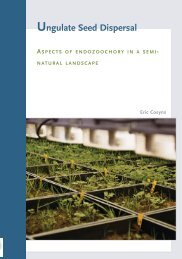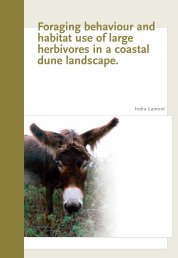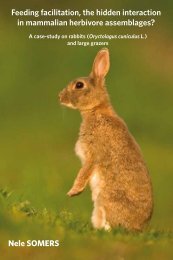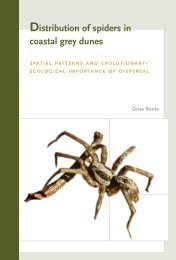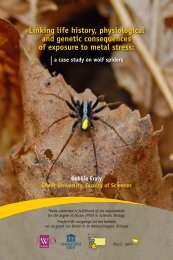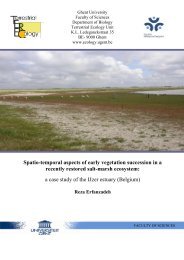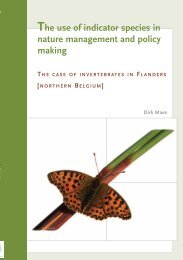PhD Arthur Decae 2010 - Ghent Ecology - Universiteit Gent
PhD Arthur Decae 2010 - Ghent Ecology - Universiteit Gent
PhD Arthur Decae 2010 - Ghent Ecology - Universiteit Gent
Create successful ePaper yourself
Turn your PDF publications into a flip-book with our unique Google optimized e-Paper software.
Acknowledgements<br />
Because this thesis consists of a series of papers that have already been published, or that are<br />
submitted for publication, acknowledgements are provided separately with each paper or in<br />
each chapter. The thesis could not have been written however without the help of others not<br />
directly involved in the published material.<br />
My special thanks go to Dr. Rudy Jocqué and the late Prof. Dr. Jean–Pierre Maelfait for their<br />
warm enthusiasm, active help and provision of the conditions in which this project could<br />
succeed. I furthermore thank Jean-Pierre for taking-up the position as my promotor and for<br />
the valuable advice he gave me in the earlier stages of the work. I am also very grateful to<br />
Prof. Dr. Dries Bonte for taking over the difficult task of being my promotor after the tragic<br />
and much too early death of Jean-Pierre and to Prof. Dr. Luc Lens for his friendly help and<br />
willingness to give me a place to work at the TEREC laboratories. I thank the members of the<br />
promotion committees Prof. Dr. D. Bonte, Dr. R. Jocqué, Prof. Dr. F. Hendrickx, Prof. Dr. J.<br />
Mertens, Dr. R. Bosmans and Dr. Jan Bosselaers for their enthusiasm to contribute to my<br />
studies and I thank all my colleague <strong>PhD</strong> students for the friendly reception they provided me<br />
at the TEREC laboratories. I thank the University of <strong>Gent</strong> for accepting me as a student and<br />
for financing the expenses made in order to successfully carry out this thesis work. I am also<br />
greatly indebted to many personal friends and family members for their mental support and<br />
the constant interest they showed in the progression of my spider work. Finally I thank Nollie<br />
Hallensleben, my wife and life’s companion for over forty years, for her help in preparing this<br />
thesis.<br />
A thesis usually marks the beginning of a scientific career and is therefore accompanied by a<br />
curriculum vitae and a list of publications aimed to help the young doctor at a prospective<br />
professional start. That is not the case here. This thesis is written at the end of a professional<br />
career in which science did not play a central role, but was constantly present as a matter of<br />
special interest and useful background to achieve all sorts of practical goals. The motivation<br />
to nevertheless produce this thesis is that I hope to encourage interest in a branch of science<br />
that, after a providential start in the last quarter of the nineteenth century, got bogged down in<br />
its own confusion and the changing interests in the biological sciences. The study of<br />
mygalomorph spiders started off in the Mediterranean where early savants of Natural History<br />
such as J.T. Moggridge, E. Simon, A. Ausserer, O. Pickard-Cambridge, T. Thorell and others<br />
carried out their pioneering research. Their work, building a solid taxonomic basis for<br />
understanding mygalomorph spider diversity in the Mediterranean Region, unfortunately has<br />
never been satisfactorily finished. When in the course of the twentieth century the focus of<br />
biological science shifted from classical Systematics and Taxonomy to more predictive and<br />
process orientated studies, attention for biological description faded and no further progress<br />
was made in the knowledge of the Mediterranean mygalomorph spider fauna. In the<br />
awakening of modern biodiversity studies however, there is a renewed interest in questions of<br />
species identity and identification. Knowledge about how many species there are and which<br />
species occurs where is important again. Due to the unfinished taxonomical work these<br />
questions, when asked in relation to Mediterranean mygalomorph spiders, are very difficult to<br />
answer. Nevertheless, these questions are now asked by a number of young researchers that<br />
live and work in countries bordering the Mediterranean or that are located in the<br />
Mediterranean climate zone. As an older arachnologist I hope to be able to act as a mediator<br />
between the generations providing helpful background information for new studies in<br />
Phylogenetics and Phylogeography. This thesis is therefore dedicated to all these young<br />
researchers whose names feature in the acknowledgements of the here collected papers.<br />
1



